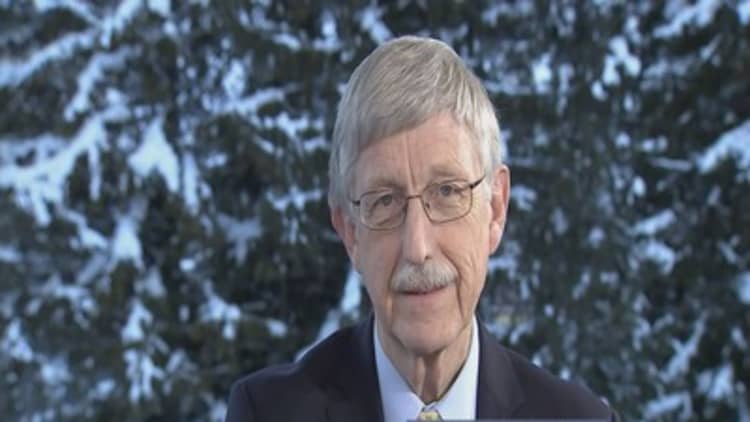
More than four decades ago, former president Richard Nixon declared a "War On Cancer." Just last month, President Obama launched the latest salvo in the conflict by appointing Vice President Joe Biden launch a "moonshot" in the fight to find a cure for the deadly disease.
At the World Economic Forum in Davos, Switzerland this week, Biden—who last year lost his son Beau to brain cancer—met with global cancer experts. One of them was Francis Collins, Director of the National Institutes of Health (NIH), who told CNBC's "On the Money" that the public was nearing an "inflection point" in the war on the dreaded disease.
Read MoreWhile Obama gives speech, Biden unveils cancer moonshot
In an interview, Collins acknowledged that people may be "a little cynical" because it's been 45 years since officials declared the "war on cancer." In the interim, the world has lost countless numbers to the disease.
Despite the setbacks, however, "we've got its number. We understand what's going on inside the cancer cell."
The NIH official, who has led the agency since 2009, said that cancer was "not one disease. It's hundreds of diseases…and we're going to make progress on those at different paces."
'Mistakes in DNA'
Based in Bethesda, Maryland, the NIH is a the world's largest biomedical research agency. Prior to his ascension, he ran the Human Genome Project, which found landmark discoveries of genetic links to diseases.
That work is at the forefront of progress against the disease.
"Cancer is a disease of the genome. It happens because of mistakes in DNA," said Collins, who added researchers can now look at a cancerous tumor and see "which genes are involved in that person's cancer."
That means that doctors "can match that up with a strategy to stop that growth or even to kill those cells altogether," he said. "That's a new concept. We didn't have the ability to do that until the technology came along and made it possible."
Collins told CNBC progress with how to "activate the immune system" has also led to discoveries to "find answers, treatments and even cures compared to where we were a few years ago. We're probably, all of us fighting off little cancers every day that we never know about because our immune system is out there looking for them, " he added.
But, he explains, sometimes cancer cells "get pretty clever" and they hide where "the immune system doesn't see them." He added that immune cells can effectively be 'taught' to identify potential problems.
Collins says there's been "dramatic progress" with using the immune system to treat some cancers "particularly melanoma, leukemia and lymphoma."
Amid the litany of cancers that invade the body, such as those of the pancreas, breast and prostate, Collins suggested that researchers were still at a loss to explain how to engineer a cure that would work for all of them. That said, "we can get there, but it's going to take a big push."
Congress just provided some of that push by increasing the NIH's funding by two billion dollars, bringing this year's total to $32 billion dollars, the agency's biggest budget increase in a decade.
"It's been a big shot in the arm for the NIH," Collins told CNBC. "We've been really squeezed losing ground for the last ten years, in terms of resources." Adjusted for inflation, the NIH had lost about a quarter of its purchasing power since 2003 to fund its mission: biomedical research.
Beyond cancer, the agency is also seeking cures for chronic diseases like diabetes and Alzheimer's disease. Collins said the NIH is "making progress on all those fronts", and has obtained extra Congressional funding for the purpose, to the tune of $350 million.
Researchers are "seeing real evidence of benefits" from clinical trials for Alzheimer's disease, he added, but the key is to start early before the degenerative process takes its toll.
"You don't want to wait until somebody already has far advanced symptoms and has lost memory," he said. "You want to find people who are at high risk, maybe even before they've shown any symptoms and then intervene. "
Collins said that after a lot of failed [Alzheimer's] trials and a "lot of sense of pessimism, that field is turning around in a big way".
On the Money airs on CNBC Sundays at 5:30 am, or check listings for air times in local markets.





